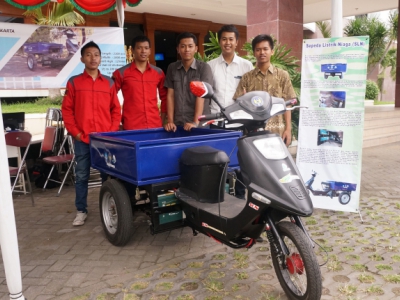YSU Students Develops an Electric Three-Wheeler

YSU Faculty of Engineering encourages its students to make new innovations. Recently, an electric three-wheeler has been developed by several students of the faculty in collaboration with a student of YSU graduate school. The vehicle is provided with a container of which size is 100x90 in length and 30 cm in height. The innovators are Bagus Tri Sugiarto, Johan Ferdian, M.Klidah, Ali Murtadho (Mechanical Engineering Education Study Program), Arif Nugroho (Automotive Engineering Study Program), Teguh Arifin (Electrical Engineering Study Program) and Taufik Wisnu (Post Graduate student) under the supervision of Dr. Mujiyono and Dr. Eng. Didik Nurdiyanto from the Faculty of Engineering.
Bagus Tri Sugiarto stated that this project is a collaboration program between the Center of Empowerment of Knowledge and Technology (Pusdatek FT UNY) and Ministry of Research and Technology. “The Ministry offered us unused differential gears to be innovated into three wheelers,” Bagus said.
The team were assigned to design the three wheeler based on the concepts they have learned before. Beside emphasizing on the three wheeler concept, the team also worked on load capacity especially when driving on narrow path.
The electric three-wheeler is able to load 500 kg with a speed of 60 km/hour. The battery has 48 volt 32 Ah for 60 kilometers which is aimed at minimizing transportation cost.
“It still uses manual battery charger for laptop. However, we plan to design a more efficient recharging system for this,” Bagus added.
It is a go-green electrical three-wheeler which has been equipped with forward and backward controls resembling those of a car. The vehicle also has a transmission. “There are low and high speed settings controlled through a lever beside the seat,” Bagus stated.
Later on, the team plan to develop the vehicle to have higher battery capacity as well as an automatic container.
The vehicle has been introduced to numerous mobile vendors in traditional markets and it received positive responses. However, those vendors demanded that the team can produce the vehicle on a massive scale and each unit costs around 25-30 millions rupiahs. “Massive production will make it much cheaper to buy this vehicle,” he said. (hryo)

